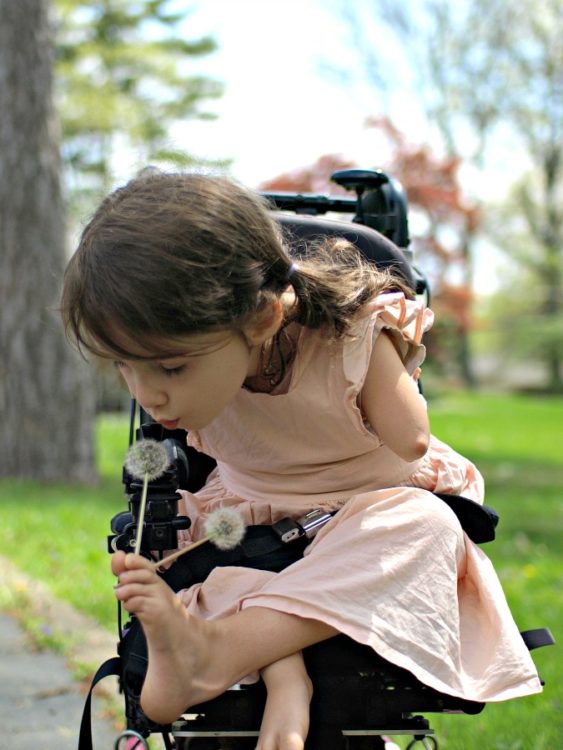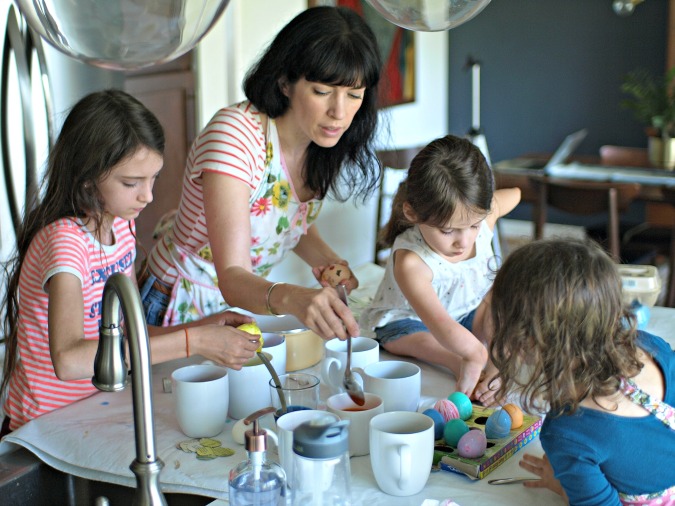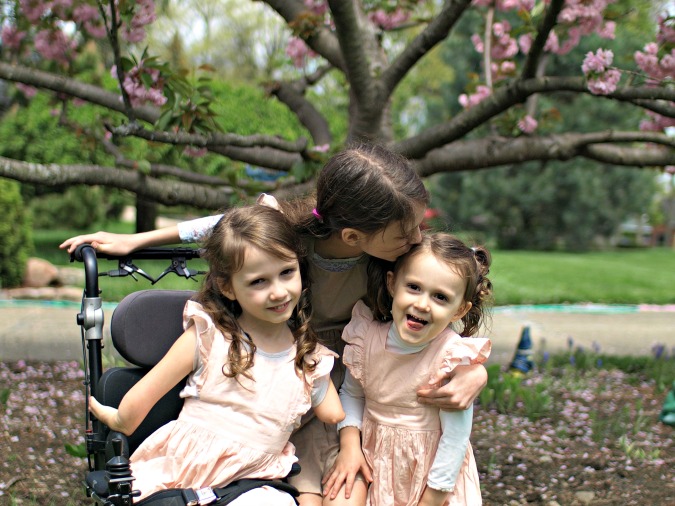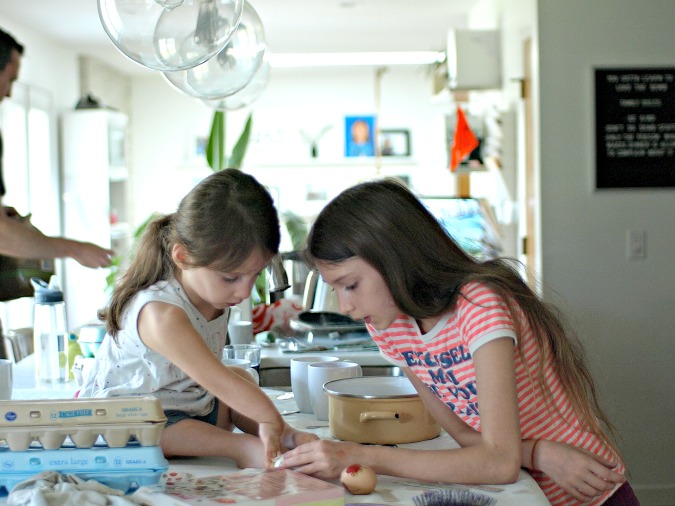What’s wrong with you?
What’s wrong with you?
What’s wrong with you?
Staring. Staring. Pointing. Whispering.
What’s wrong with you?
Imagine being asked that question on a semi-regular basis. Now, imagine being asked that question on a semi-regular basis by complete strangers. Finally, imagine being asked that question on a semi-regular basis, by complete strangers, and you’re only 6 years old. What does that do to a kid? What does that do to a person over a lifetime?
I don’t know, but it’s been on my mind a lot lately. I’m not just worried about what that does to a kid or a person. I’m worried about what it will do to my kid, my person. Because this is my daughter’s reality.
Over the years I’ve shared our journey of fear to love and I’ve tried to talk really positively about disability, because I feel positive about disability. While I agree that disability can still be a complicated issue — for example, I certainly would have a hard time if I lost an arm or the ability to walk and some families do struggle more under the weight of caretaking and the medical costs — I no longer view disability as inherently negative and I certainly no longer see disability as an inferior experience in the human condition. A person in a wheelchair in not inherently inferior to a person who can walk. A person with intellectual disabilities is not inherently inferior to a person with a higher IQ. From day one I have always tried to communicate the love, the humanity and even the normalcy of disability because disability is normal part of life.
But sometimes I fear I’ve sugar coated what it’s like to have a child with a disability in a world where disability is rarely represented, and if it is, it is most often seen as inferior, sad, undesirable and wrong.

It occurred to me recently my identity as mom is most often preempted with “special needs“ mom. I am a “regular” mom, too, but in the context of motherhood, I can never seem to shake the “special needs” prefix. Do I care more about being one type of mom or another? Does everything that comes out of my mouth have to be about disability? Why is this badge of parenting a child with a disability so important for me to wear all the time?
I sat on these questions for a few days.
During this time, we went somewhere as a family and there was a little boy who said things about my daughter, Lamp, that were rude-ish. I don’t remember seeing his family anywhere, and in fact I barely remember this situation. It’s all blurry around the edges because I’ve dealt with it a hundred times before. (Note: I was going to say a million times, but then I thought “I don’t want to exaggerate.” So I said a hundred times and now I’ve underestimated.) I had to educate this young boy while at the same time protecting my daughter’s feelings and sense of self.
As soon as that exchange was over I immediately thought to myself: Right. That’s why.
Motherhood asks a lot of us. I remember being a mom before I was a mom to a child with a disability and it was hard and wonderful and soul-stretching all on it’s own. It truly was. But being a mom to a child with a disability asks more of me. Strangely, it’s not in the ways I thought it would be.
It’s not hard being Lamp’s mom. But it is hard being Lamp’s mom in a world that doesn’t acknowledge her or people like her on a macro level.
Because when we don’t acknowledge people who are disabled by having them in our TV shows, in our magazines, in our children’s books, in our commercials and more importantly in our classrooms and workplaces, then we often have an overabundance of acknowledgement on a micro level, particularly when we go out in public. People — typically other children, but also adults — point, stare and whisper because they have never seen anyone like her before.

On our recent Disney cruise we were informed of an incident in the Oceaneer’s club (a kids-only club on board the ship that watches and entertains your kids ages 3-11) of a little girl pointing at Lamp and calling her names. The staff went to great lengths to make sure the situation was addressed and rectified. The girl was stopped immediately. Her parents were called and informed. She was removed from the kids club and was later made to apologize to Lamp.
When I asked Lamp about it she sorta brushed it off. As I pressed her for information she got a little annoyed and tried to tell me it was no big deal. She then went on to detail three other incidents just from that day. Instead of sending her to the kids’ club I felt like I had been sending her into the lion’s den.
Thankfully, there was an upside as well — overall she still enjoyed her time there and even had a little band of new friends who rallied around her. But as I walked her into the club that night — as if on cue, like the universe wanted to back up Lamp’s words just in case I doubted them (I didn’t) — a boy followed us closely asking what happened to her arm, reaching out to touch her hand. Sometimes I forget just how constant this kind of attention can be for her in a new environment. Even with me, her mom, right there telling the boy over and over again that she was born this way and please stop grabbing her arm, it took a good four or five tries before he finally left us alone.
She took it in stride. She always takes it in stride.
I, however, was guilt ridden for the duration of our cruise. I should have done more to prepare the staff — teach them what to look for, how to intervene and what to say. It also occurs to me that in an alternate reality — one where children with disabilities were featured in Disney cartoons every now and then, or if there was a popular children’s book character in a wheelchair, this whole scenario might not be so foreign to them.
As we sat across from our friends that evening at dinner, after watching and hearing about these interactions that day, our friend said incredulously, “So do you guys deal with this all day, every day?”
I exhaled, “Not everyday because we have a safe bubble of our neighborhood, school and church. But in a place like this, filled with lots of children who have never met Lamp or even seen someone like her… yeah, it’s all the time.”
It feels good, in a validating sort of way, when a wave of realization of how disruptive this sort of input is to one’s life settles on someone else’s shoulders. I wish it happened more often.

I remember watching a reality TV show one time that featured a woman in a wheelchair. She said the hardest part of being in a wheelchair was dealing with the stares of pity. This was before I had Lamp and I didn’t get it. The general feeling in my mind was, Well of course we feel bad for you… you’re in a wheelchair. No one would want to be in a wheelchair.
Interestingly enough, the very first lessons I learned as Lamp’s mom were about pity. She was such a happy baby, she smiled easily and had such a sweet and calm demeanor. Just like any new mother I loved my baby. I was proud to be her mother. Which is why when one woman at church came up to me with a crumpled look on her face and told me my daughter just breaks her husband’s heart and went on to call her a “poor thing,” it was a verbal slap in the face.
Oh. There it was. That was pity. The damning, judging, stinging pain of pity. She didn’t see a smiling, happy baby. She didn’t see the potential for a happy life. She saw a poor thing. Pity is judgment. Pity is damnation. Pity was taking one look at my daughter with her limb differences and assuming her life was automatically sadder, harder and less desirable than someone else’s.
Screw you, pity.
Do you have a bank of memories for encounters your child has had with other random children (or adults) over the years? You know, just kids they’ve met at the playground, a restaurant, schools or on the street? I don’t have those banks of memories with my oldest child and my youngest child, but I have them with Lamp.
I remember the couple sitting opposite us on a NYC subway, pointing at our 8-month-old daughter and talking back and forth to each other while staring at her with absolutely no discretion or sheepishness for their bold and shameful actions. We were too stunned and too new to this new reality to know what to do. So we did nothing.
I remember the time in Chick-Fil-A where we were surrounded by a group of children and one boy said, “Why does she have that robot arm?” And another girl said, “Why does she have that Barbie arm?” And on the verge of tears I answered them both that they are not robot or barbie arms as their moms sat feet away and chose not to intervene in this conversation.
I remember the little girl who screamed and cried and pointed at my daughter on top of a playground structure that Lamp was scaring her, as a barely 2-year-old Lamp was scooting toward her trying to make friends with the screaming child. Thankfully, her mother came and grabbed her away, her eyes locking with mine and she fled with her screaming child, mouthing the words, “I’m so sorry.”
I remember the sisters at the bookstore, the younger one saying she didn’t want to be Lamp’s friend and the older one — maybe 5 –compassionately looked at Lamp and said, “Well I want to be her friend.” I was so thankful for that little girl.
I remember the first time we flew with Lamp and her power-chair and as she got off the plane in Florida a crowd of random strangers started clapping for her as she drove her power-chair off of the runway. Not meant to be rude, but it was certainly strange and confusing.
I remember the time PSP’s entire second grade swarmed to the side of the playground to stare and gawk at Lamp while she burst into tears on my shoulder and the teachers stood by doing absolutely nothing to pull the kids away from my daughter and back onto the playground.
I remember the two separate times we went to a specific playground and once again had a circle of children gathered around Lamp as she tried to play — this time the circle including teenagers — who we had to shoo away and tell them to leave her alone, she just wants to play. Again, this happened on two separate occasions at the same playground. We’ve never gone back to that playground.
I remember the kids who stood in line at a playground downtown, pointing and staring at her mere inches away, when I bent over and put my face in their line of sight and said “HI,” loudly as we often do to let people know we see them staring.
I remember.

My hope is when I share these stories, people will read them and re-think the way the world is structured. Perhaps you’ll see the discrimination and the lack of representation in the media and agree all of this contributes to a problematic reality for our daughter and other people with disabilities. I know that’s what happens to me when I read stories from people of color who talk about discrimination, or when I read about sexist policies or discrimination against the LGBT communities.
My fear is that it doesn’t work the same way with the disabled community.
My fear is that while these stories have perhaps tugged at your heartstrings, the disability community is still so “other” that we don’t connect it with the same need for humanity, social awareness and inclusion. Disability is still so “other” that when the nation of Iceland boasts they haven’t had a child with Down Syndrome born there in nine years due to selective abortion, no one seems to bat an eye or call this a humanitarian crisis. We still see the disabled as so “other” that when 19 disabled people are murdered in Japan it doesn’t even last one news cycle and no one calls it a hate crime. We still see the disabled as so “other” that it is completely legal to pay them less than minimum wage. We still see the disabled as so “other” that they are the only minority group that can still be legally segregated at work and at school. (see video here)
So what do I want from all this? Here’s what I want:
I want the world to make a space for my daughter. I want it to be a safe space that is accessible by wheelchair and accessible by opportunity.
I want to see more disabled bodies in the world around us doing everyday normal things. I want to see them in magazines, on TV (thank you Speechless), in children’s books, in movies (preferably not committing suicide because they’re disabled), in music, in plays, in school, in day-to-day jobs and in places of business.
And while I’m putting my wants out into the Universe, I might as well tell you all I have written a children’s book featuring a character with a prominent disability and I have spent the past several months trying to find an agent willing to represent me and this book. I want someone in the publishing industry to realize we need beautiful children’s books filled with illustrations of human children (not animals, not toys) who have disabilities and that it would be very normal — a reflection of the actual world we live in — to have picture books with such diverse children in them.
I want to see more education in our schools about disability. I want to see parents engage with their children in a conversation when they meet a child who is disabled. (My personal guide here.)
I add my voice to the many, many, many, many, many, many voices out there trying to educate and share messages of inclusion. The messages and the disabled experience itself are too vast and wildly subjective to distill into one overall message, so I won’t try. But I will say this:
There is nothing wrong with being disabled. But there is something wrong with society’s overall view of disability.
Because when the world looks at a bright, happy and smiling 6-year-old girl and constantly asks her, “what’s wrong with you?” I can’t help but want to grab society by its great, big collective shoulders, give them a vigorous shake and say, “No. What’s wrong with you?”
We want to hear your story. Become a Mighty contributor here.

